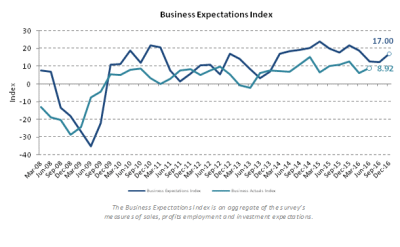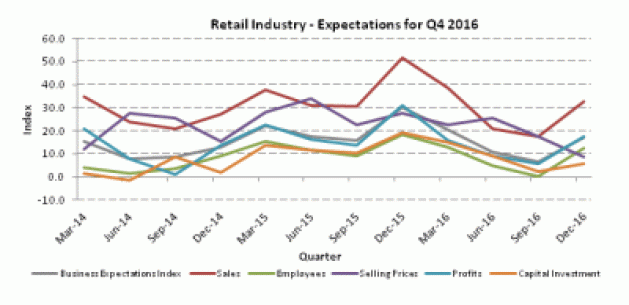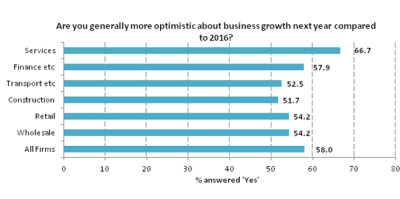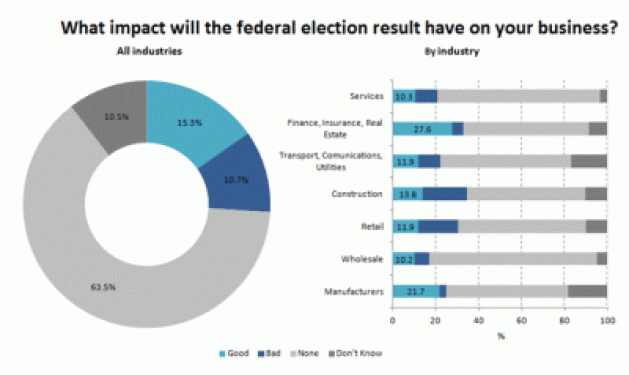Australian business attitudes are upbeat as we head into the year-end holiday trading period. According to Dun & Bradstreet’s September Business Expectations Survey, companies are anticipating increased sales, profits, employee numbers and selling prices in the December quarter, compared to the September quarter. However, compared to the final quarter of 2015, expectations are lower in all components of the survey.
Economics advisor to Dun & Bradstreet Stephen Koukoulas said: “The generally positive tone to business expectations has continued, which points to an ongoing solid pace of expansion for the economy over the remainder of 2016. The upswing for expected sales, profits and employment has been sustained in the most recent survey, aided, it would appear, by the record low interest rate settings and evidence of policy progress from the re-elected Turnbull government.”
Dun & Bradstreet’s Business Expectations Index, the average of the survey’s measures of Sales, Profits, Employment and Capital Investment, has jumped 37.1 per cent to 17.0 points for the fourth quarter of 2016, up from 12.4 points for Q3 2016, but down 22.0 per cent from 21.8 points in Q4 2015. The final Q4 result is 9.1 points above the 10-year average of 7.9 points.

“Expectations for capital investment remain subdued, which is a concern for the economy given the still unfolding decline in mining investment plans,” Mr Koukoulas added. The Capital Investment Expectations Index was the only index which saw a decline for the December quarter compared to the September quarter, with the index falling 23.3 per cent from 10.3 points to 7.9 points. Year-on-year, the index dropped 33.6 per cent.
“The ongoing weakness in expected selling prices is consistent with the near record low inflation rate that has been evident in recent quarters, and suggests that official interest rates will remain very low, at least in the near term,” Mr Koukoulas noted.
Expectations for selling prices in the three months to 31 December remained flat compared to last quarter, with the index at 9.3 points. Some 19.8 per cent of firms expect to increase their selling prices in the December quarter, while 10.5 per cent said they would decrease selling prices. Compared to the final quarter of 2015, the Selling Prices Expectations Index has fallen 42.6 per cent from 16.2 points.
Profit expectations were up 81.9 per cent for the December quarter compared to the September quarter, with all industries flagging an increase in profits. The Profit Expectations Index rose from 9.4 points in the September quarter to 17.1 points in the December quarter, with 33.6 per cent of executives expecting to see greater profits in the final three months of the year. However, when compared to the same time last year, the Profit Expectations Index fell 25.3 per cent from 22.9 points.
Meanwhile, 22.5 per cent of companies said they would employ more staff in Q4 compared to Q3, while 9.5 per cent said they would decrease staff numbers. The Employment Expectations Index climbed 58.5 per cent to 13.0 points.
The Retail industry returned especially strong scores when looking ahead to the holiday period, with retailers expecting higher sales, employee numbers, profits and capital investment in the December quarter. The uptick in expectations follows three consecutive quarters of declining expectations among Retail businesses. Most notably, the Employment Expectations Index for the Retail sector leapt from 0.2 points to 12.4 points. The Selling Prices Expectations Index fell, sliding 50.3 per cent from 17.3 points to 8.6 points, which is consistent with discounting in the sector. Compared to the corresponding quarter in 2015, expectations for all components (Sales, Profits, Employment, Capital Investment and Selling Prices) were lower.

Looking back on the June quarter, businesses generally reported an improvement in actual results for Q2 compared to Q1. The Business Actuals Index was up 45.9 per cent from 6.1 points to 8.9 points. In particular, profits saw a strong improvement in the second quarter, with the index increasing more than sevenfold from 1.1 points to 7.9 points. Some 28.9 per cent of companies said they had increased their profits in the second quarter (compared to the first quarter), while 21.1 per cent said they had seen lower profits in that period.
With the new year approaching, 58.0 per cent of businesses said they are more optimistic about business growth in 2017 compared to 2016. The Services industry had the most upbeat outlook, with 66.7 per cent of firms saying they were more optimistic about growth in 2017, compared to 21.1 per cent who are less optimistic (net result: 45.6 points). This optimism reflects the industry’s broadly positive sentiment moving into the December quarter: companies in the Services sector said they anticipate an increase in sales, employment, profits and selling prices in the three months to 31 December, but lower capital investment.
By comparison, just 54.2 per cent of Wholesalers said they are more optimistic about growth in 2017 compared to 2016, while 39.0 per cent said they are less optimistic (net result: 15.3 points).

Optimism regarding the results of July’s federal election is waning, with just 15.3 per cent of firms expecting a positive impact (down from 20.7 per cent in the August survey). Some 10.7 per cent of businesses said they expect a negative impact. However, the majority of respondents (63.5 per cent) said the result will have no impact on their business. The rest are unsure what impact the result will have. The Finance, Insurance and Real Estate sector maintains its positive outlook, with 27.6 per cent of companies in that industry forecasting a positive impact, compared to just 5.2 per cent that expect a negative impact (net result: 22.4 points). Meanwhile, 20.7 per cent of Construction companies expect a poor outcome form the result of the election, compared to 13.8 per cent that anticipate a good outcome (net result: -6.9 points).






